How accurate was Kubrick's "2001: A Space Odyssey" about the future?
I recently re-watched Stanley Kubrick's 1968 movie masterpiece "2001: A Space Odyssey", and I was struck by how accurate many of the film's portrayals of the future were.
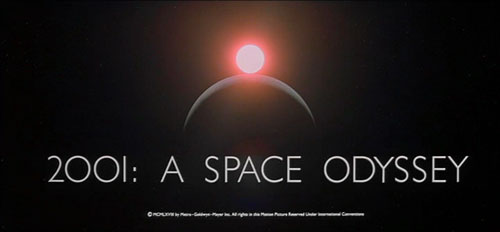
And by one or two things that weren't quite so accurate.
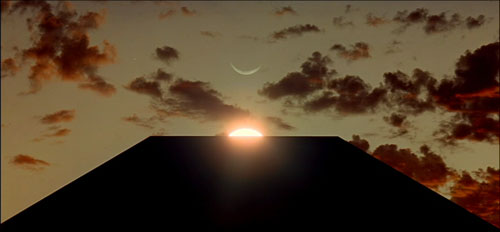
Plane shaped spacecraft
An orbiting space station that is reached by using a shuttle craft that resembles an airplane design?
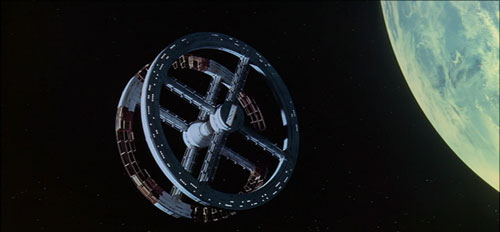
When the movie was made, space travel mostly consisted of putting people on top of a massive missile, and then setting fire to the bottom of it. Construction of the first NASA Space Shuttle was 6 years away, and Salyat 1, Earth's first low level orbiting space station, didn't launch until 1971.
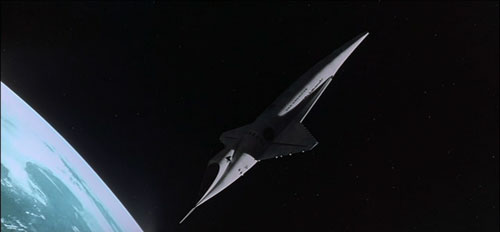
The airplane design may turn out to be a blip in the history of space travel however, as the NASA shuttle fleet is retiring next year, and the USA intends to go back to pod-shaped craft atop rockets.
At seat TV entertainment
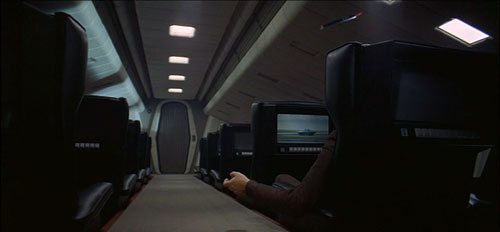
Kubrick's film evocatively captures the humdrum tedium that regular space travel would no doubt develop into, and makes it closely resemble the aircraft travel experience. The back of the head-rests in the shuttle feature small TV screens, something that wouldn't actually be introduced to airplanes until the 1980s.
The videophone booth
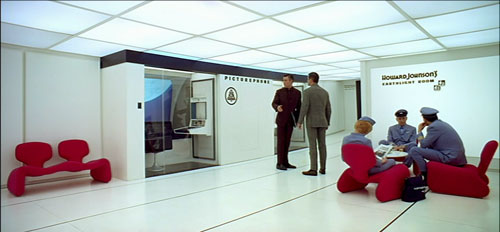
The single thing that I think the film gets most wrong about the future is the video call sequence. In fact, although on present day earth mobile phones are more prevalent than toothbrushes, in "2001: A Space Odyssey" there are no personal mobile communication devices on display at all.
Not only does Dr. Heywood R. Floyd step into a booth to make a call, he also has to remember the number to physically dial - something unthinkable today in an era of contact address books and speed-dial.
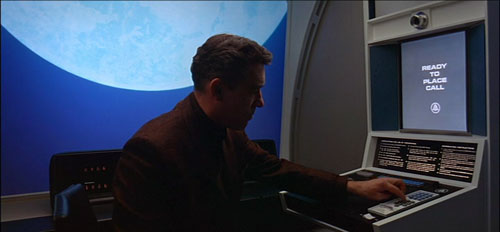
There are some realistic touches however. He quaintly still calls it the "telephone", even though it is clearly branded 'Picturephone'. He also pulls out a credit card that still looks recognisably like the size and type of plastic payment card we still use today.
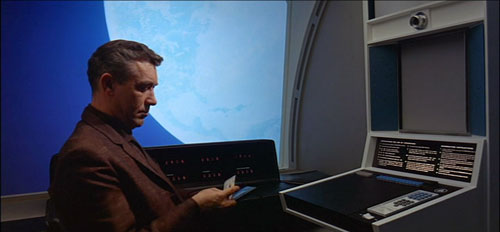
Kids are rubbish on the phone
Even if the whole concept of the sit down video phone booth was off kilter, the film gets one thing absolutely right - children are rubbish on the phone.
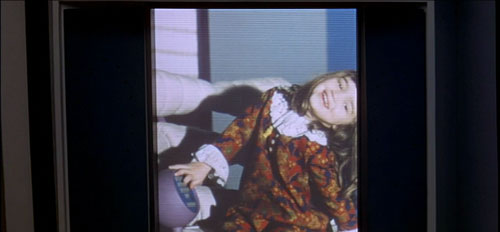
It doesn't matter how many times Dr Floyd carefully spells it out, we all know that his daughter, over-excited on the day before her birthday, will never tell her mum that he called.
And if you called your 6 year old daughter right now, she wouldn't pass on a message either.
The Russians would not have employed Rigsby
It isn't that British comedy actors can't do a star turn in Kubrick movies. In fact Peter Sellers is the central pivot of 'Dr Strangelove'. The problem is that, 6 years before 'Rising Damp' hit British television, Leonard Rossiter is basically playing a Russian scientist as if he were Rupert Rigsby.
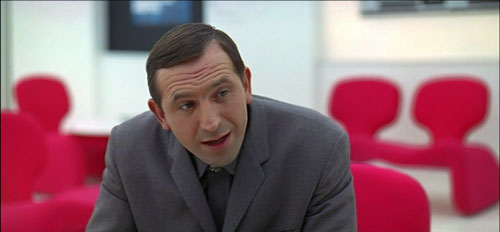
When Dr. Andrei Smyslov first appears Rossiter is doing that awkward shuffling hands-behind-his-back adjusting his clothes thing that Rigsby does, and the actor delivers a performance that revolves around the same stammering and licking of the lips.
It is a point that probably now only afflicts British viewers of a certain age, but I'm almost certain that he is going to cry out "Ooh, Miss Jones" at any moment.
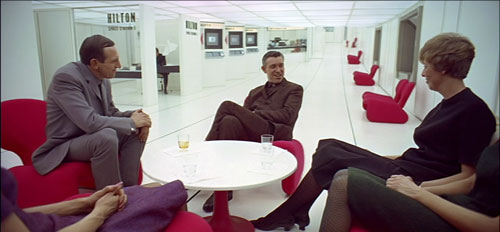
Pan Am will exist
Pan Am went bankrupt and dissolved on January 8, 1991. Not according to the movie however, where the 'space food' on the moon shuttle comes complete with contemporary 1960's Pan-Am branding.
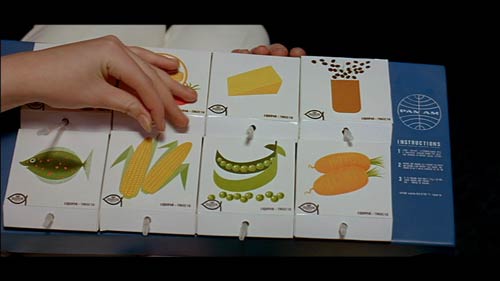
The future of cameras
Mixed fortunes for the predictions in the film here. During the sequence when the scientists start posing in front of the alien monolith like package tourists, the camera equipment looks pretty similar to that used later in real life space missions.
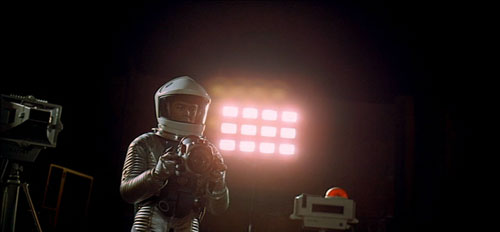
In an earlier sequence, however, the 'still-camera-without-flash-that-looks-like-a-cine-camera' is way off the mark.
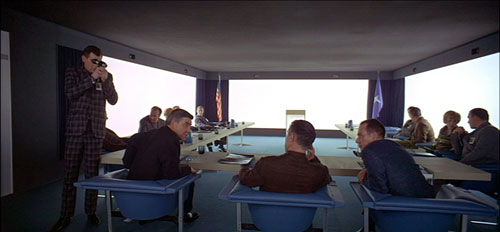
As is the suit the photographer is wearing.
No PowerPoint
Part of the reason that Dr Floyd has been sent to Clavius Base is to deliver a morale-boosting speech to a crew bemused by what they have unearthed on the moon.
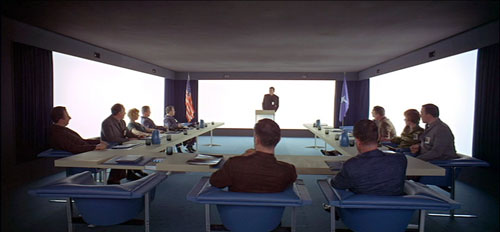
Frankly, there is no way that this would have been done in the real 2001 without the judicious use of PowerPoint featuring Excel charts and inspiring pictures of puppies, and probably some free branded goodies to take away and cheer everybody up.
Death Star docking bay
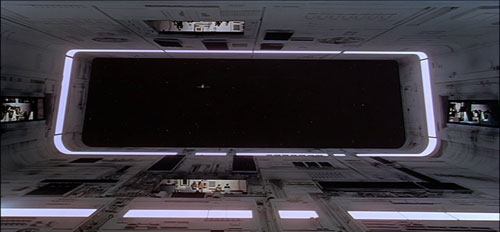
It may have all taken place 'A long time ago, in a galaxy far, far away', but there is no way on Earth you'll convince me that the designers for 1977's "Star Wars: A New Hope" weren't thinking of "2001: A Space Odyssey" when they designed the Death Star docking bay.
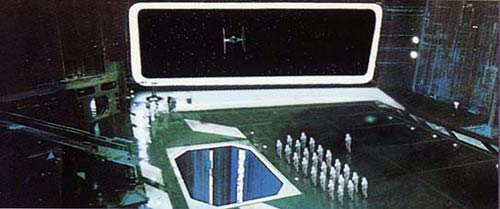
The BBC will have more channels
In 2001, Kubrick's movie envisioned that the BBC would be broadcasting BBC 12. The film was released in 1968, a year after BBC Two had started regularly transmitting in colour.
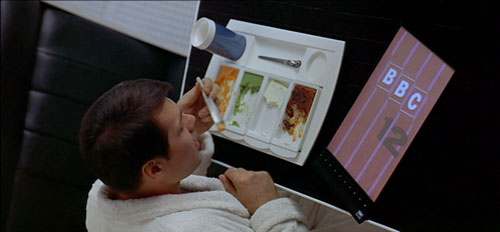
Actually in 2001, the BBC was struggling to convert BBC Choice and BBC Knowledge into BBC's Three and Four. Even now, including CBBC, CBeebies, BBC Parliament and the BBC News Channel, the Corporation is still a long way off launching a twelfth linear television channel.
Kubrick also didn't predict the 1990s Lambie-Nairn inspired straightening of the BBC logo.

Computers are good at chess
The history of machines that purported to play chess dates back to the Mechanical Turk of the 1700s, when Wolfgang von Kempelen tried to convince people that his 'machine' could play intelligently.
Actual games between computers and world class humans began in 1960s, with David Levy winning a bet that no machine would beat him during a decade. Deep Blue famously beat Garry Kasparov in 1997, and now most strong chess players can regularly be defeated by machine.
Although, frankly, my ZX Spectrum could usually outwit me during the 1980s.
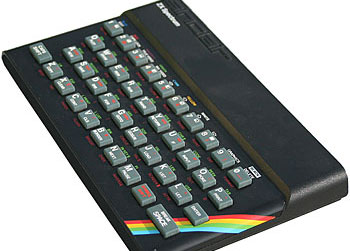
In "2001: A Space Odyssey" we see Hal not only beat Frank Poole, but act slightly condescendingly to him into the bargain. The book explains that HAL was programmed to only win some of the time, to make it worthwhile for the astronauts to play the game.
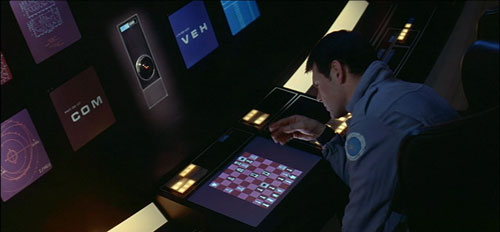
Of course, some people argue that chess is a natural environment for computers to thrive, since it is a game of cold mathematics and logic. I'd like to see a computer that could win at Subbuteo.
Incidentally, is this account of the fictional Poole - HAL 9000 chess game the single most geekiest page on Wikipedia?
Space repairs are difficult
We all chortled at the astronaut who recently dropped their tool-kit whist on a space walk, but "2001: A Space Odyssey" captures the dull intricacy of doing space repairs in the sequence during which Dr. David Bowman is outside to retrieve the 'faulty' AE-35 circuit.
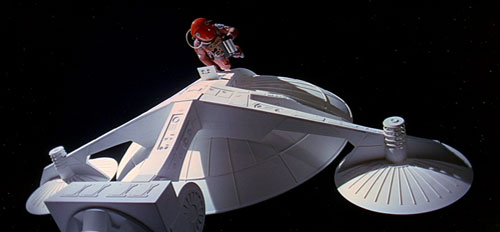
Rather than the Star Trek universe, where the captain simply voice commands the computer to "re-route power from the dilithium crystals to the auxiliary circuits", the Discovery One crew have to venture outside to replace crucial components.
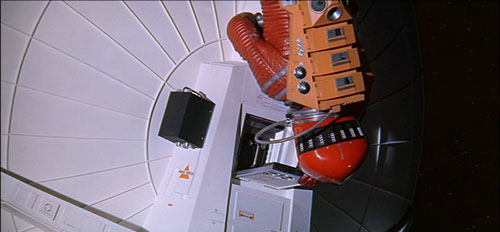
Robot arms for EVA
NASA first used a robot arm for carrying out tasks outside of the shuttle early in the 1980s, but in 1968 Stanley Kubrick's film had already predicted the concept of robotic limbs taking part in space missions.
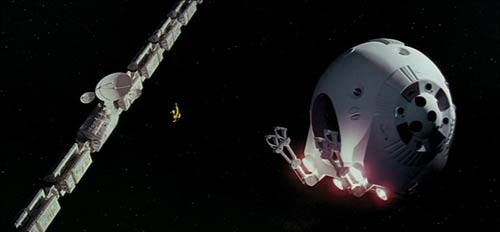
The NASA ones were not under the control of a murderous super-computer though, which undoubtedly helped.
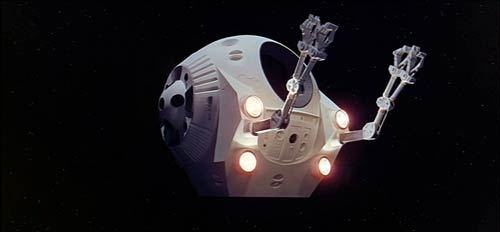
Lip synch and voice recognition
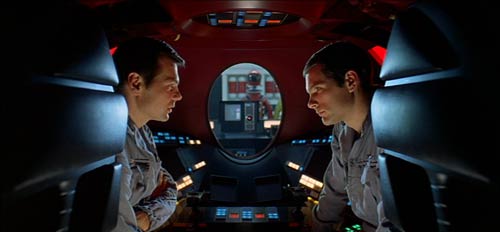
You can debate ethically whether HAL's demise is due to a programming flaw, or an aberrant personality trait, but there are still no computers around that can do a good job of lip-reading. Simple voice recognition is increasingly more possible, but the natural language conversations that the astronauts have with HAL, or that he eavesdrops on, are still very much the stuff of science fiction.
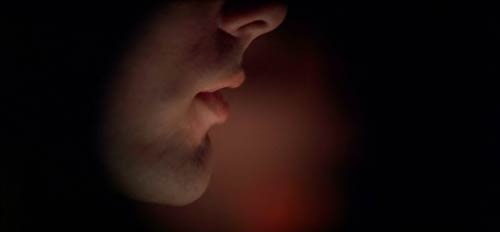
Modular memory
They don't look particularly like modern Intel chips, but as Bowman deactivates Hal, the way he does it by progressively removing memory circuits is something that still applies to the architecture of our home computers today.
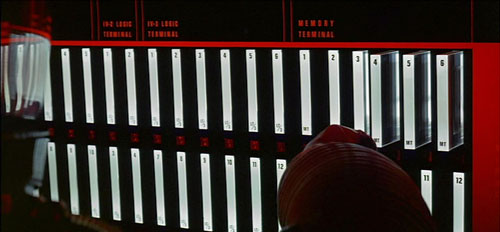
And anyone who has ever tried to fiddle about with their MacBook to upgrade the machine's RAM will sympathise with the efforts that he has to go to in order to gain access to them.
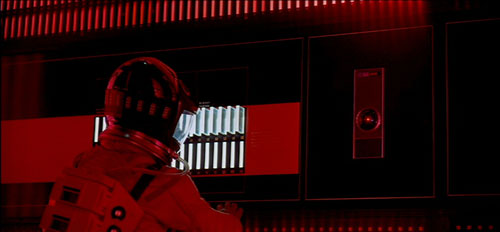
Doctor Who credits
The climax of "2001: A Space Odyssey" might be equal parts baffling and stimulating depending on how chemically enhanced you are, but there is one section that leaps off the screen at me as a British thirtysomething.
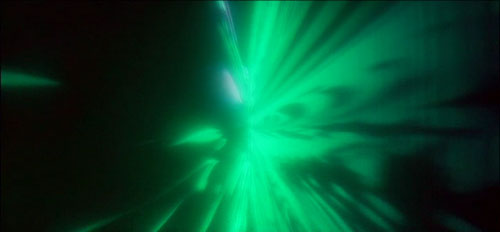
I don't think there can be any doubt that the final slit-scan sequence was the inspiration behind the opening titles that graced the bulk of Jon Pertwee and Tom Baker's epsiodes as Doctor Who.
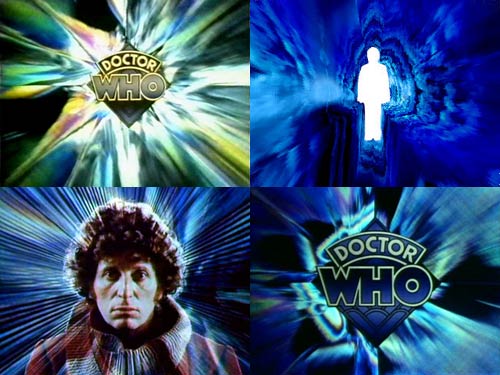
Man's curiosity
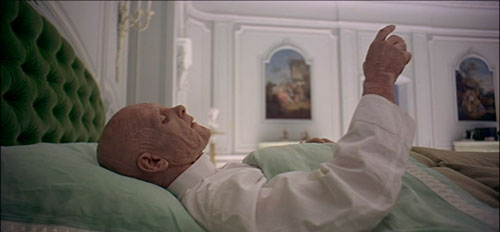
It isn't really a futurist prediction in the film, but even on his death bed David Bowman still demonstrates the human trait of curiosity by reaching out for the monolith.
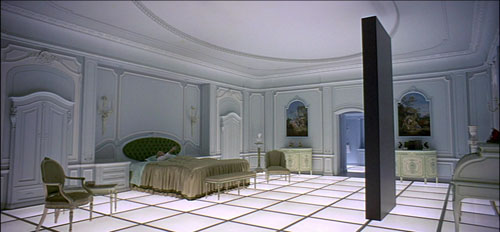
In recent years the experiment at CERN and the epic travels of NASA's valiant little Mars Rovers have shown that man's curiosity about the universe around him has not diminished since Arthur C. Clarke and Stanley Kubrick worked together on the "2001: A Space Odyssey" screenplay in 1960s.
End credits
Still images taken from "2001: A Space Odyssey" ©1968 MGM.
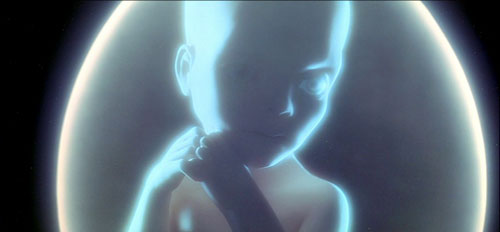
If you enjoyed this post, you might also be interested in:
The Buffy guide to the Internet - 1997 style - February 2008
A Brief History Of Time (Travel) - 10 Years Of Online Doctor Who - BBC Internet blog, November 2007
"The Tardis and Multiplatform" - September 2007
The making of Doctor Who webcasts - August 2004
If you want to re-re-watch it, the movie will be shown on a big-ish screen for free in Canary Wharf next Monday 23rd February.
Cracking post Martin.
For me the biggest thing that thet got wrong was the forecast of how easy space travel was giong to be in 2001.
I know that growing up in the 1970's we all thought that we would be flying to the moon for our holidays.
Unfortunately technology and safety has not kept up with expectation.
Secondly where is the net in the film?
Interesting post, i enjoyed that movie back in the day, although it was a bit on the sluggish side. I like all the parallels to today's tech and advances, it is great to see where he was very close and where he missed the mark totally. I think a lot of these old sci-fi movies put ideas in peoples heads and some of it comes true.
Genius.
TV in portrait aspect?
The biggest thing Kubrick got wrong? That 2001 would be a year to look forward to. So much of the hope we had for it got dashed to hell.
As far as watching the film again, I've seen it many times over the years - including on a friend's gigantic television - but ideally, the monolith needs to be bigger than me. . . and that dictates the silver screen.
You forgot to mention 2001 prediction of aircraft/Shuttle "glass cockpit" displays. The Earth/Lunar transfer craft and the lunar transport craft both had "glass cockpits"
While it has been covered by many publications before, how can a review of 2001's 'predictions' gloss over the lack of artificial intelligence? The fact HAL could play chess or real lips are much less compelling than the fact it could converse in natural language and approximate thought and even emotion to an extent. Even in 2009 computers that can effectively interact akin to how a person could are still well in the future.
I love seeing movies made 15 years ago or whenever, showing that in 2005 or so we'd all by in flying cars and so on.
Soon hopefully :P
actually the prediction above such as Lip synch and voice recognition or Plane shaped spacecraft show that most of them are either present or starting to be produced , actually i think science fiction is kind of creative mind which first shows unimaginable things in such movies then people start to think "hey thats possible" and then some scientist work along to get that thing done thats how science progresses
When Dr. Floyd is seen drinking something through a straw during his meal on the way to the space station (in a weightless environment) the liquid can be seen to fall back down to a lower level once he stops sucking on it. That could only happen in gravity. In zero gravity, it would have kept coming out. MISTAKE!
I really want to see this again now. I might have to see if it is out on Blu-ray.
A computer playing Subbuteo, now that I would like to see. I bet it would still step on the men and bend them on the base though. Maybe it could iron the pitch before the game too?
True, one of the best movies off all times, but let's not forget Arthur C. Clarke, actually the mind behind all, because it's well known that SF writers are true visionaries, many of them described long time before the modern world.
You missed two anachronisms that I only really saw when I had the opportunity to see 2001 on the big screen.
First, when Floyd and the group are having their pictures taken at the monolith, the photographer is cranking the camera (Its the action when he turns the camera sideways). The camera case they used in the film is an underwater camera case. This one is a maybe because it could be argued that there are cases where archiving important events on film is still done.
Second, when HAL first reports the fault in the communication system to Bowman and Pool, he asks if they want a hard copy of his report. When they say yes, he spits out a Punch-card! (I only saw this on the big-screen, its so small)
I love to watch movies which are made before 2000 to compare the technological advance we made these days. The movies that does not recognize mobile phones just cannot be accepted. Heroes going to telephone booth to call someone is something we cannot think about these days. Remembering my best friends number? it is not possible I would speed dial 2 and i will get connected to my best friend.
World is changing and the past scenarios still excite us.
Wow.. Its funny the see old films trying to "see" the future and actually hits really well too.
The Virgin space craft is plane shapped too isn't it? While Nasa might be going back, it could still be that commercial space flight ends up going that way in the end.
Anyway, what a great film!
Really liked this article and you made some good points, especially love the "I'd like to see a computer that could win at Subbuteo." -priceless lol
Really interesting read. It seems Space Odyssey's vision of the future was less far-fetched than many other movies. Looking at how life in the 21st century was generally portrayed around that time (and even later), you'd think we'd all be hovering along in our hovercars and sitting down to relax by our holographic displays.
I received the UFO series, originally done in 1969, for Christmas. Like 2001, it had some hits and misses too. Some of it was rather ambitious, being set in the early 80's rather than 2001. They did a pretty good job of anticipating computer usage and personal/office telecommunications although with a 1960's flair to it.
Perhaps the most interesting post-anachronistic thing was the cigarette smoking, even on the moonbase!
All interesting, and both Clarke and Kubrick were visionaries in prose and cinema. The film and the novel showcase and foreshadow a number of technologies, but it is the film's attention to detail that still fascinates me. Sure, the plot may still mystify some four decades on, and the movie may plod on a bit, but for sheer beauty and cinematographic purity, good luck finding another space epic that got so much right. As well, the soundtrack is priceless - what better way to deal with the fact of the soundless vacuum of space than to background the transports' landings, on the space station and on the moon, with Strauss' Thus Spak Zarathustra.
Wow this really made me think. I'm gonna have to go back and watch 2001 space odyssey again! Hehe at least until Avatar comes out on Blu-Ray.
Hehe, love that movie. What do you think about Avatar's portrayal of the future by the way? Do you think it's more accurate than 2001's version? I think it definitely at least strikes a chord with the approach that big business corporations will take when space travel becomes like that of 2001's world.
Agree with glass cockpits-- Kubrick's vision there was 100% spot-on. The space plane cockpit could be confused for a 747 cockpit right now. Surprised you missed that.
A great read! I wonder how much our films of today have got right about the future. I just hope it's not Event Horizon that takes the prize!
Wow - this was a great read! I'm watching this movie tonight and love to read stuff like this just ahead of the movie.
Good to see you have a sense of humor. I'm currently writing about this film and was looking for some photographs. Glad I stumbled across this. I might send you a copy of my finished work.
In the book HAL's Legacy, contributor Donald Norman points out a number of particulars in which the filmmakers were mistaken as to the direction that computer interfaces were to take. What's sad, though, is that, HAL conspicuously excepted, a rationally-ordered global civilization could have accomplished much of the spread into space envisaged by 2001: the orbiting wheel, the moon bases, even a manned mission to the outer planets would all have been plausibly within the reach of a planetary society less determined to squander its treasure and energies on plunder and war. Kubrick's vision is a reproach to our failure, and also a transcendent cultural artifact of the last century, fit to stand comparison with Genesis or the Iliad as expressions in mythic terms of their respective civilizations.
Great post. I'm an avid chess player, and I first saw the movie 10 years ago. The chess portrayal of the movie is really accurate. No top-ranked chess player today can beat a top-ranked (Yeah! They have computer chess tournaments) computer playing even given a sufficiently long race. There is however a new trend today that features a human and a computer battling against another human and a computer popularized by Garry Kasparov.
Great post, but a bit harsh on the videophone used in the film. I see it as an early version of Skype. Personal mobiles wouldn't have the range and, anyway, mobile videophones are still in their infancy in 2010. So Kubrick and Clarke still lead on that one.
The "spaceplane" design looks like several that are currently on the drawing boards or even undergoing testing, such as Spaceship One or Skylon (the latter is even a Single-Stage to Orbit design as in the film).
I still haven't seen this movie yet. I've wanted to, but never got around to it. Another movie that's fun to compare how the future was portrayed vs. reality is Back to the Future 2. I'm still hoping we'll have hoverboards one day. :)
Though NASA is retiring their shuttles this year and deciding to put their astronauts back into pods, sir Richard Branson is building quite awesome space shuttles that look even better than planes. As you probably know you can even book a space flight with virgin galactic for as little as 200k ;] Well, either one day I'll be rich or ticket's price drop, otherwise I won't be able to see myself in space... Anyhow, we are experiencing further exploration of space, so the Odyssey continues.
Yep, the space exploration of space is good, and Space Odyssey has shown it unrealisticly nice. We human beeings are doing with space the same thing as with the earth - we make it so unclean that we can hardly live their further. Byt this, I presume, is for the next Odyssey.
I don't think anyone has mentioned the 'ipad' tablet style portable flat screen computers that Dave Bowman and Frank Poole have on their desks, this is the section when they are eating and watching their interviews on Earth with a news team. Later in the film you see Bowman and Poole writing on paper notepads, a shame since the concept of a tablet computer was evident in the film. All the computer displays were done by rear projected animation and no computer was used to generate them. There are some exceptional using of this faux computer generated imagery in the film, the section where the communication module is being repaired has some excellent close ups of the display showing a three dimensional vector representation of the comms module. Also the PCB diagnosis section of the comms module is also first rate. The special effects in this film stand the test of time and some are truly visionary offerings.
Like a few other readers, i haven't seen this movie just yet. I have only seen a few minutes of it. But in regards to overall movies and there accuracy about the future, i don't think too many of them got it right. For example, almost every movie about the future expected us the be flying around in flying cars by now and i don't know about you, but i still haven't seen any flying Civics.
Yeah. Kubrick was really ahead of his time in many aspects. He's one of those people that are on a lot of who would you have dinner with Dead or Alive lists.
Great movie. One thats so simple and yet conveys such accurately what he wanted. Attention to detail - hats off to Stanley Kubrick (SK).
I hope one day we will create AI and probably convert our consciousness into those machines ;)
It showed real promise. I just wonder how accurate Planet of the Apes was about our future. Forget Hi-tech we're going back to wearing animal skins and clubbing caveman style.
The "idiot light" warning of the cryogenic life support system failures struck me as anachronistic. This type of illuminated button was becoming popular in cars at the time (OIL, instead of an oil pressure guage). By 2001, and through the present, they have definitely evolved -- they now use an icon (engine, oil, etc.) but never explicit information like "LIFE SUPPORT SYSTEMS HAVE FAILED". What's the icon for dead astronauts inside?
I disagree with "the 'still-camera-without-flash-that-looks-like-a-cine-camera' is way off the mark". I think it's dead-on for predicting digital cameras with no film or moving parts that don't need flash. Granted, digital cameras in the real year 2001 weren't as small and streamlined as the one shown in the film, my 1999 Sony Mavica (with a whopping 1.3megapixels!) looked sorta like a small shoebox, but it was digital. I remember watching 2001 in 1968 and seeing that photographer taking pictures with something the size of a cigarette lighter and thinking "how the heck do they get the film into THAT thing??"...never even dreaming of the now-common process of digital sensors and storage medium. I now use a digital camera just a bit larger than the one in 2001 -- and it can take stills AND full HD 1080p video, while storing 9 hours of video or thousands of stills (most of the time not needing a flash)on a single 32 gig SDHC card the size of a postage stamp! I think that's pretty darn prescient of Kubrick in 1968.
"For example, almost every movie about the future expected us the be flying around in flying cars by now and i don't know about you, but i still haven't seen any flying Civics."
Considering the current accident rates regarding current ground-based vehicles do you really want flying cars? If something goes wrong, whether due to mechanical failure or human idiocy, you *WILL* be going down! And *NOT* in the soft'n'fluffy sort of way upon an unoccupied piece of undeveloped land like the Sojourner Rover on Mars in July 1997 (a very memorable July 4th, BTW). And that's if you're lucky! Now think of the boneheadedly *STUPID* things do in current transportation already.
Besides, the cost is too high. You have to be diddled by a very perverted and psychotically-mad scientist first (at the very least) to get one.
--Bekki